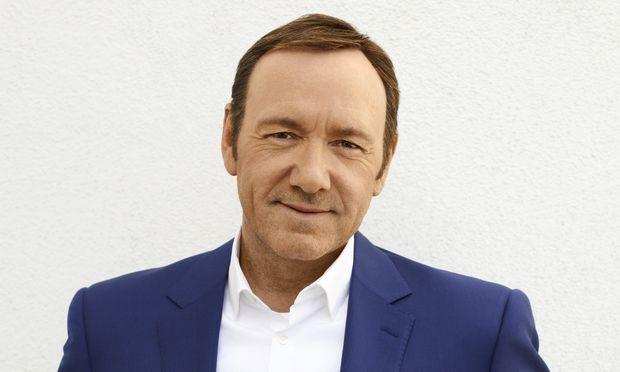From Richard III to Frank Underwood, Kevin Spacey plays villains with a healthy dose of glee
Film and stage actor Kevin Spacey
Francis Underwood, the scheming politician in the Netflix series, House of Cards, lets nobody stand in the way of his rise to power.
Underwood’s literary precedent is a British king, Richard III, Shakespeare’s archetype of the amoral climber. Actor Kevin Spacey plays both roles, and like many actors before him, relishes the fun of playing a charismatic, irresitably entertaining villain.
Starting in 2011, Spacey played Richard III in a globe-trotting theatrical production directed by Oscar-winner Sam Mendes. Both Richard and Francis Underwood are ruthless tacticians, and both break the fourth wall to boast to viewers about their brilliant machinations. According to Spacey, that’s not a coincidence.
“Michael Dobbs, who wrote the original book, based the character of Francis on Richard III,” he says. And playing Underwood’s precursor on stage helped Spacey in the TV role.
“Now I’m just looking down the barrel of a lens, but my memory of the look in people’s eyes … you could see this kind of relish, this kind of glee from being let in on the secret,” he says. “You are becoming Francis’ co-conspirators, in very much the same way that the audience becomes Richard III’s co-conspirators.”
Spacey’s experience playing Richard III is the subject of a new documentary, NOW: In the Wings on a World Stage. It shows the camaraderie that developed among the company as they brough Richard III to 200 cities, and the delight audiences took in Spacey’s scenery-chewing villain.
Spacey’s career of playing bad guys and anti-heroes stretches back to his breakout role as “Verbal” Kint in 1995’s The Usual Suspects, which won Spacey an Academy Award. He won his second Oscar in 1999 for American Beauty, playing the middle-aged sad-sack Lester Burnham, who finally wakes up to the meaninglessness of his suburban life and the stagnation of his marriage.
“I definitely did get stopped by a lot of people who said, ‘The first time I saw American Beauty I was married. The second time I was divorced,’” he says. “We weren’t trying to increase the divorce rate.” But Spacey says it took him years to realize why Burnham appealed to a wider audience than just middle-aged men.
“He was like a child. He was being very disruptive, he was pushing the boundaries and going different places and trying new things,” Spacey says. “We all have that in ourselves, to be a little disruptive.”
This story is based on an interview by PRI's Studio 360 with Kurt Andersen, where you'll find other coverage of popular culture, design and the arts.
Francis Underwood, the scheming politician in the Netflix series, House of Cards, lets nobody stand in the way of his rise to power.
Underwood’s literary precedent is a British king, Richard III, Shakespeare’s archetype of the amoral climber. Actor Kevin Spacey plays both roles, and like many actors before him, relishes the fun of playing a charismatic, irresitably entertaining villain.
Starting in 2011, Spacey played Richard III in a globe-trotting theatrical production directed by Oscar-winner Sam Mendes. Both Richard and Francis Underwood are ruthless tacticians, and both break the fourth wall to boast to viewers about their brilliant machinations. According to Spacey, that’s not a coincidence.
“Michael Dobbs, who wrote the original book, based the character of Francis on Richard III,” he says. And playing Underwood’s precursor on stage helped Spacey in the TV role.
“Now I’m just looking down the barrel of a lens, but my memory of the look in people’s eyes … you could see this kind of relish, this kind of glee from being let in on the secret,” he says. “You are becoming Francis’ co-conspirators, in very much the same way that the audience becomes Richard III’s co-conspirators.”
Spacey’s experience playing Richard III is the subject of a new documentary, NOW: In the Wings on a World Stage. It shows the camaraderie that developed among the company as they brough Richard III to 200 cities, and the delight audiences took in Spacey’s scenery-chewing villain.
Spacey’s career of playing bad guys and anti-heroes stretches back to his breakout role as “Verbal” Kint in 1995’s The Usual Suspects, which won Spacey an Academy Award. He won his second Oscar in 1999 for American Beauty, playing the middle-aged sad-sack Lester Burnham, who finally wakes up to the meaninglessness of his suburban life and the stagnation of his marriage.
“I definitely did get stopped by a lot of people who said, ‘The first time I saw American Beauty I was married. The second time I was divorced,’” he says. “We weren’t trying to increase the divorce rate.” But Spacey says it took him years to realize why Burnham appealed to a wider audience than just middle-aged men.
“He was like a child. He was being very disruptive, he was pushing the boundaries and going different places and trying new things,” Spacey says. “We all have that in ourselves, to be a little disruptive.”
This story is based on an interview by PRI's Studio 360 with Kurt Andersen, where you'll find other coverage of popular culture, design and the arts.
